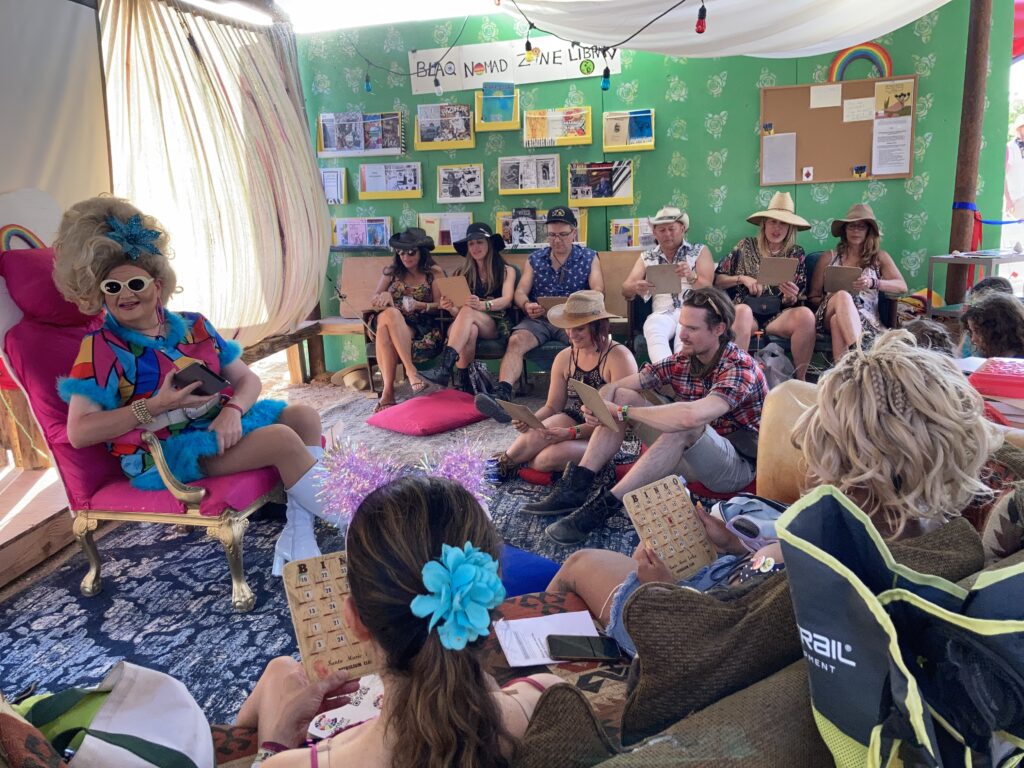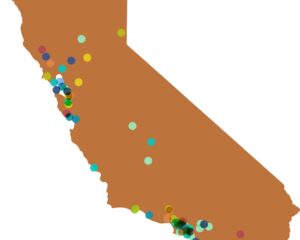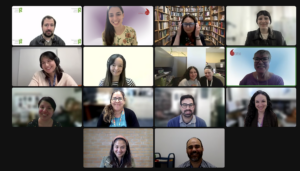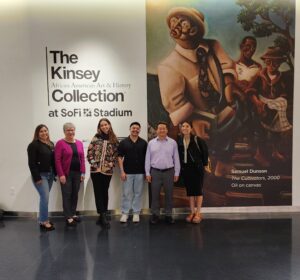Above: Drag bingo was fun at the Queer Salon, created by Project Director T. Hammidi for the May 2023 Joshua Tree Music Festival. Photo by T. Hammidi.
Hi Desert Queer & Trans Oral History Project is a public storytelling event that seeks to share and preserve LGBTQIA desert oral histories, presented by desert LGBTQIA youth and adults about arriving, surviving, and thriving in the vast and dusty Hi-Desert, a region of southern California’s western Mojave Desert. This month we caught up with Project Director, T. Hammidi, to learn more about the genesis of this project, its impact, and the exciting programming that is currently underway in Joshua Tree.
Can you tell us a little about your project, and what has inspired it?
The Hi-Desert Queer and Trans Oral History Project collects and preserves the unique regional history of LGBTQIA+ emergence in Joshua Tree and surrounding areas of the Mohave Hi-Desert through oral history interviews and public LGBTQIA+ storytelling events. I decided to document and preserve LGBTQIA+ desert histories after an inspirational chat with an interesting elder lesbian who volunteered at a local thrift shop. She was partnered with a woman who had served in the military since the 1950s, and her stories captured my attention! Then, with the onset of the Covid-19 pandemic, commercial and private real estate “land-grabbing” in the Joshua Tree and surrounding areas intensified, gentrifying the slow California desert town with rapid and dramatic changes in demography, values, economic stability, and affordable housing. The little thrift shop closed, and I lost track of the elder lesbian, leaving a gap in my heart. As long-term LGBTQIA+ desert residents were displaced to new towns in search of safe and affordable housing, what became of their stories and contributions to the desert? These and similar questions began the project.
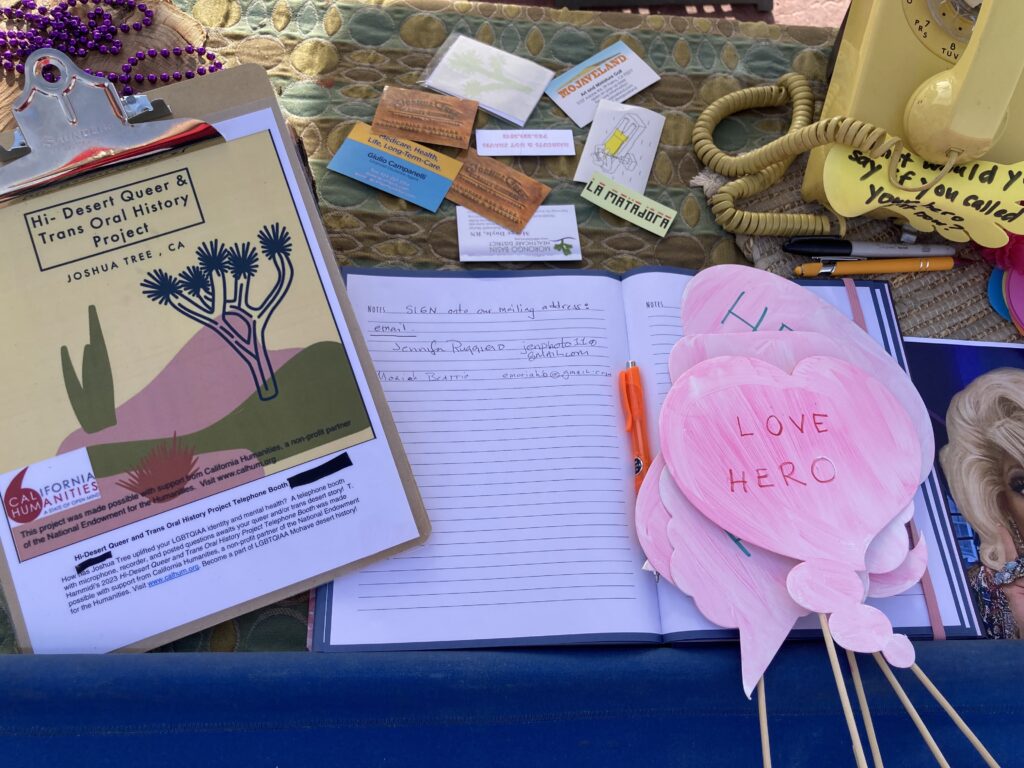
Your project seeks to foster community and affirm the identity and experiences of Queer and Trans community members in the Hi Desert, in your opinion what role does oral history and storytelling play in this effort to building community?
Learning the legacies left by ancestors is a vital tenant of cultural survival, for all marginalized communities living in cultures of violence, racism, and unequal access to resources. Storytelling is an unbiased, powerful medium for LGBTQIA+ people to celebrate each other, relay inspiration, tales of desire, family, and share real tools for surviving and thriving in climates of anti-trans/drag bigotry and threats to dignity and LGBTQIA+ civil rights. Oral history plays a special role in culling and preserving these legacies by taking deep-dives into LGBTQIA+ lives, to hear personal, collective and political stories in their nuances and circuitous routes, under a supportive limelight, unconcerned about market metrics or the speed of time. In so doing, the process of collecting stories meets community members where they are, honoring their lives and building bridges amongst listeners as an act of care, compassion, and feelings of mutual belonging. LGBTQIA+ oral histories are the fodder to deeper understandings about desert community and the networks we have created to survive, what it has been like to live in the Mojave as an LGBTQIA+, how we have found joy and safety in a region so replete of LGBTQIA+ public culture, until recently.
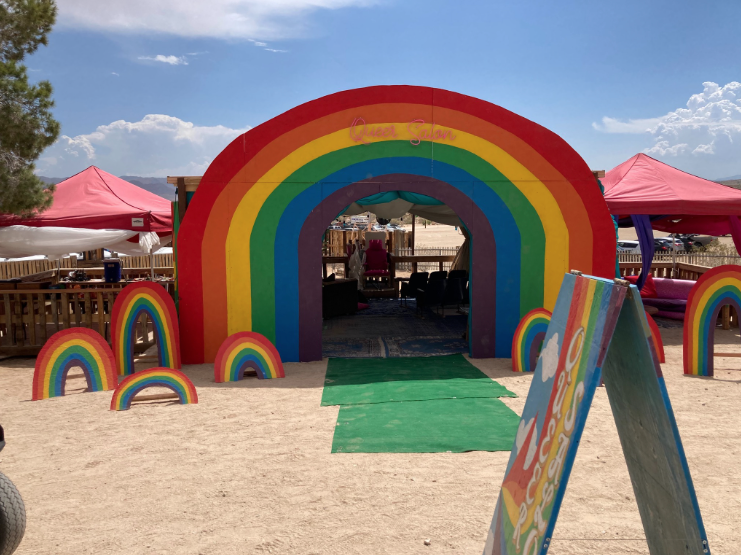
Through this project I have learned that safe community spaces outside the bar scene are crucial for LGBTQIA+s right now. At all of my events, folks shared how much they appreciated a safe place to check in and be in community with other friendly LGBTQIA+s. I also learned that folks are craving dialogue! Our Friday night “Coming Out Stories” and “Drag Story Hour” are well attended; as each participant shared their story it encouraged another participant to share! We had two youth who shared on our first night!
Your project recently implemented its first storytelling event last month in 29 Palms. Can you share a video or pictures from this event and something you took away from the experience?
We held of our first public vendor booth and public story share on stage at the “1st annual 29 Palms Pride in April 2023.” A daytime free event, we met many local LGBTQIA+ youth walking around with their friends, and solicited mailing list sign ups, to encourage LGBTQIA+ connection across social media platforms.
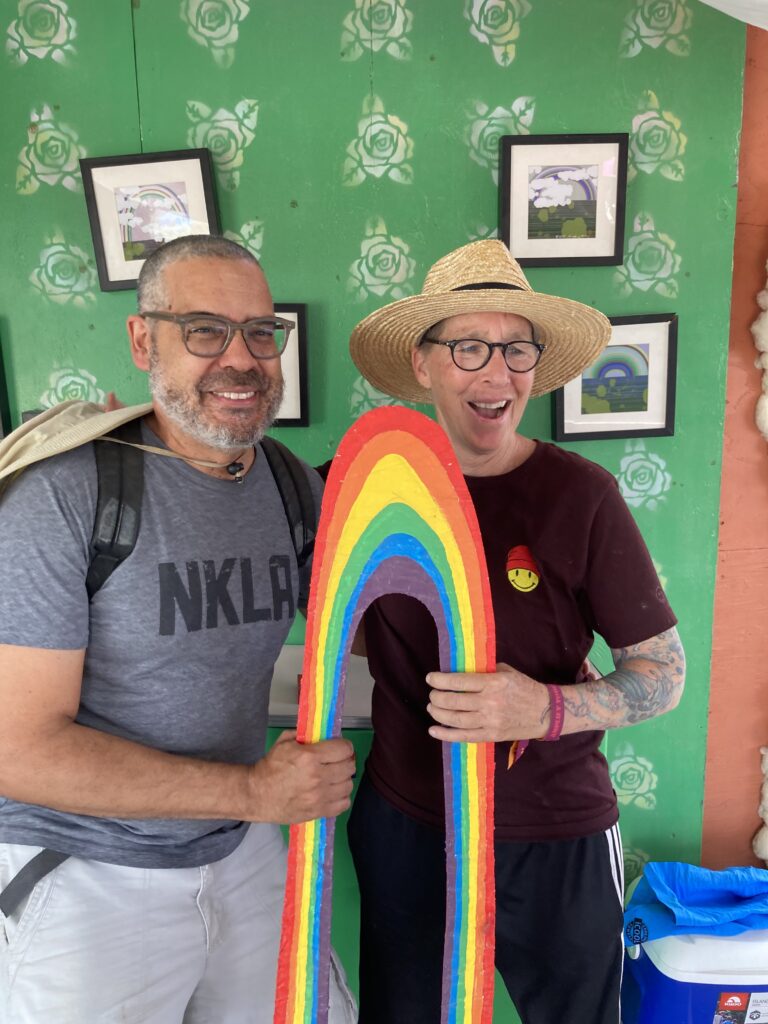
Project Director T. Hammidi (right) with desert resident at the Queer Salon, Joshua Tree Music Festival, May 2023.
Credit: Fox McBride
T. Hammidi behind the Hi Desert project table at the 29 Palms Pride Celebration, April 2023.
Credit: T. Hammidi
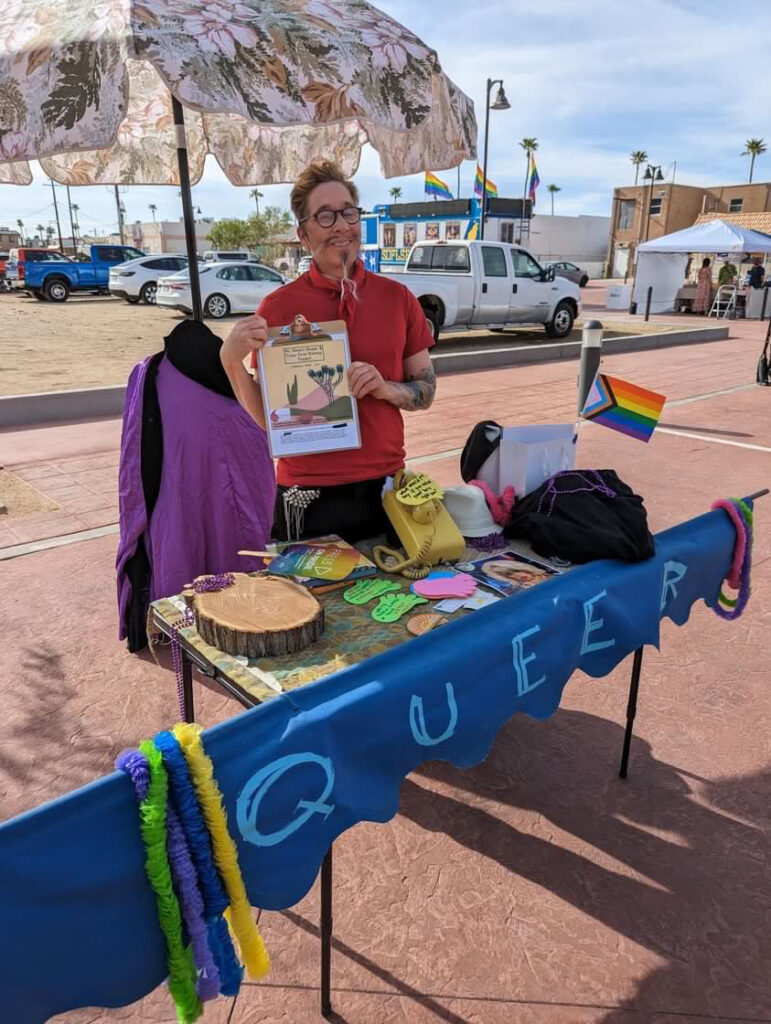
We also just installed an interactive “Hi Desert Queer & Trans Oral History Project Telephone Booth” at the 21st annual Joshua Tree Music Festival, a four-day outdoor immersive art and music event which draws in repeat attendees twice a year. The telephone booth phone was converted into an audio recording device, with questions posted inside the booth for LGBTQIA+ attendees at this desert event. The Telephone Booth sat next to a Queer Salon venue, which offered 26 LGBTQIA+ programs over the 4-days. It was such fun to watch people step into the Oral History Telephone Booth on their own and speak into the phone, offering up short story highlights of their experiences as LGBTQIA+s in the Hi Desert!
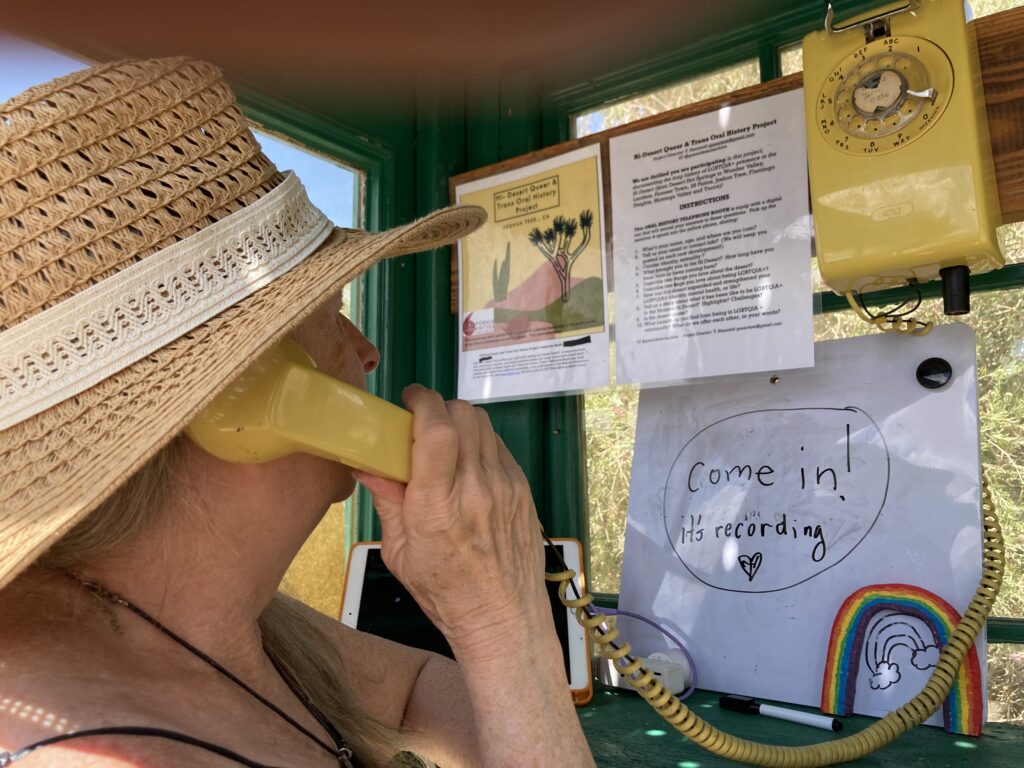
What’s next for your project, and how can our readers learn more about upcoming events or access the stories collected by the Hi Desert Queer & Trans Oral History Project?
Our Instagram for this project is @queerdesertarchive, where photos from events and new developments are posted! As the summer approaches, we have an informational display at the Hi Desert Pride art exhibition at Beatnik Gallery in downtown Joshua Tree on June 17, 2023, open from 10am-5pm to give visibility to the project and collect desert LGBTQIA+ contact information for in-home and Zoom interviews.
We are also currently editing down a fantastic interview with the lesbian couple who established the world-renowned Pappy and Harriet’s bar/music venue in Pioneer Town, so that we may air a ten-minute “slice of life” segment of these significant local heroines on a Hi Desert Queer and Trans Oral History Project podcast! We are calling it “Queer Desert Archive,” and hope to launch the first episode by July 1st! A local portrait photographer has agreed to shoot photos for long-term archival purposes, and a lesbian musician has already donated a jingle! Our two-year goals are to transcribe all our Oral History interviews into one archive, which will become a non-fiction book for publication.
In November, we will be having our final public storytelling share by the project participants, and will announce details early in the fall! We hope everyone can join us, ask questions, and be in community together.
This project is supported by a 2023 Humanities for All Quick Grant.

